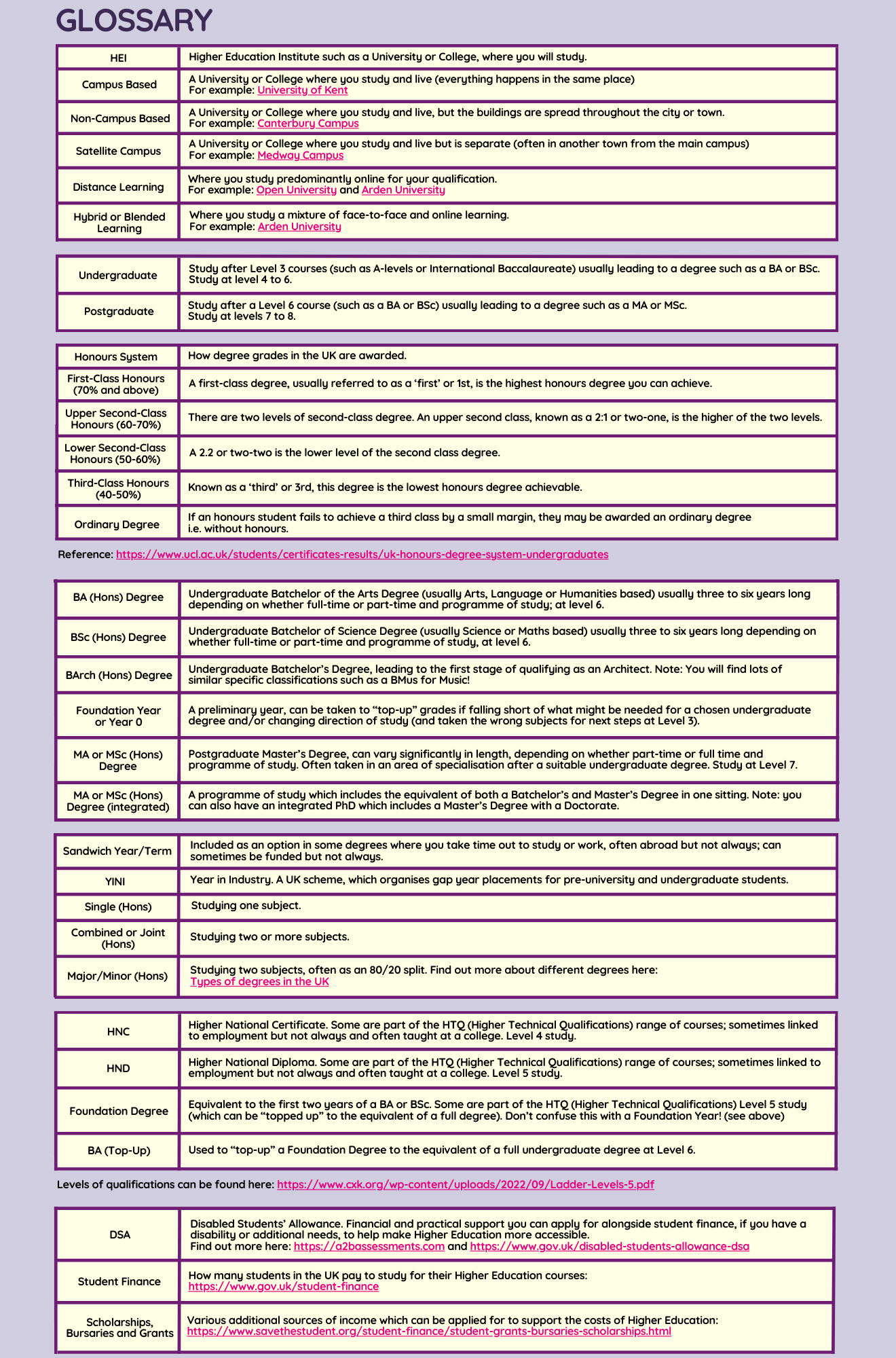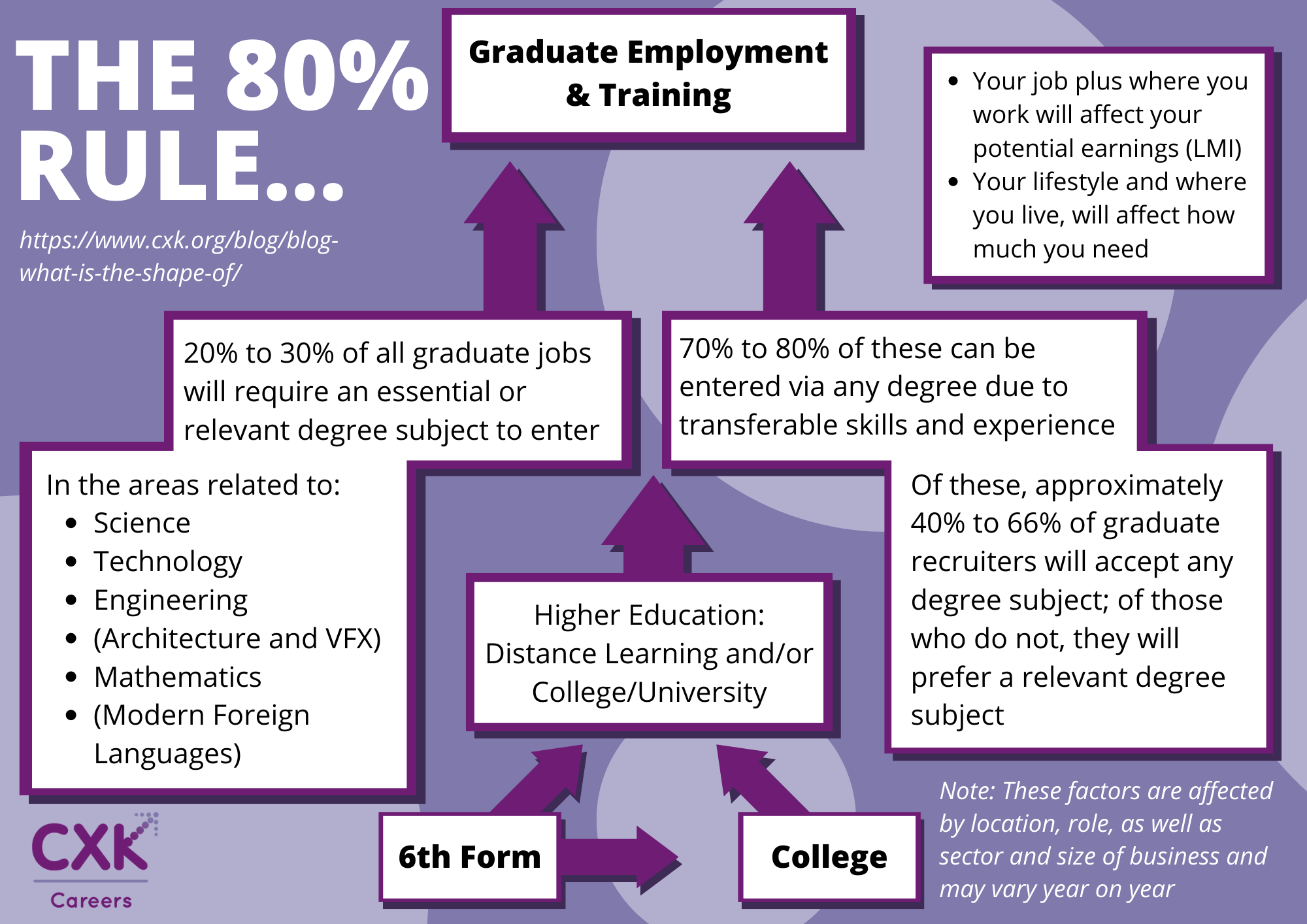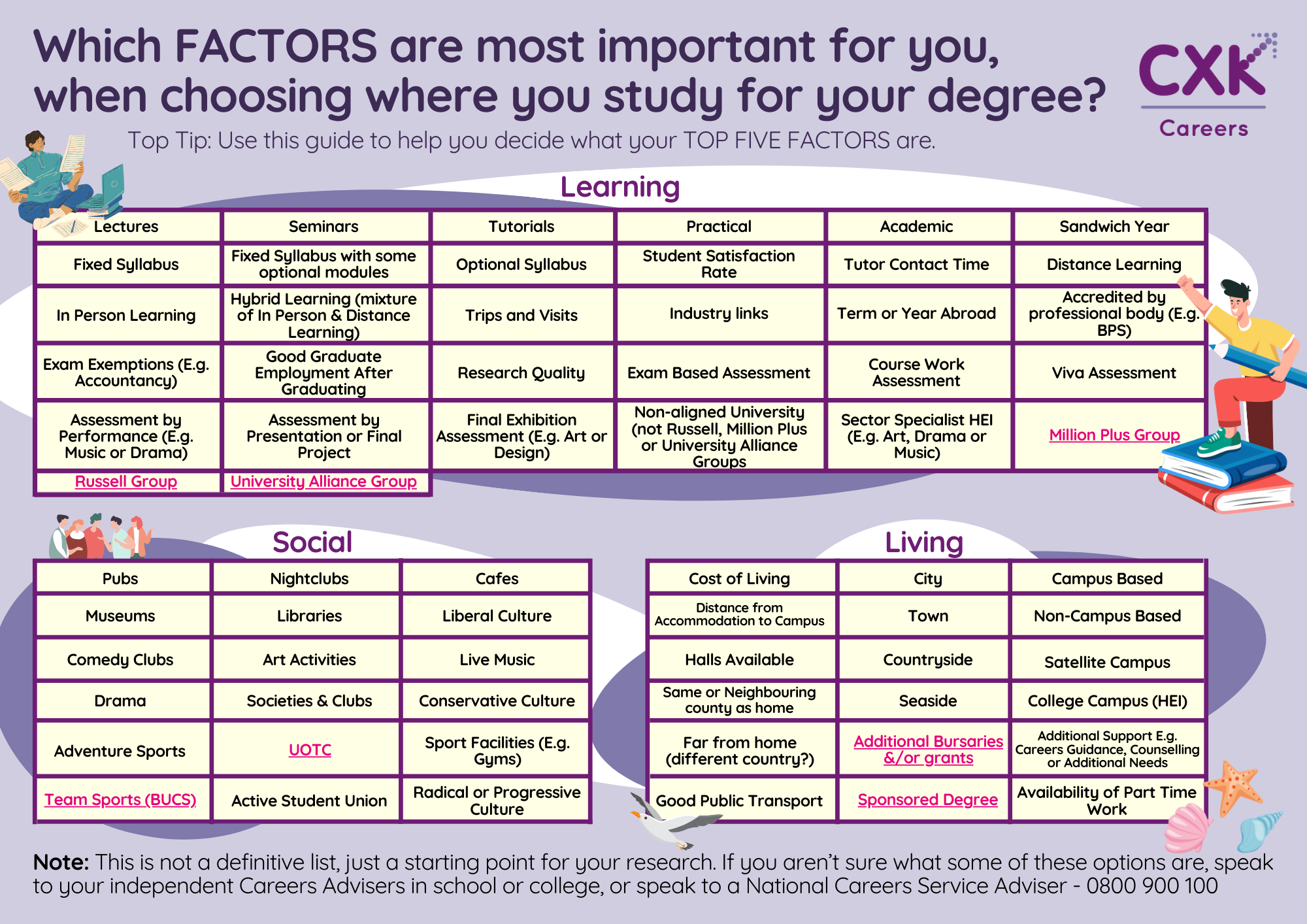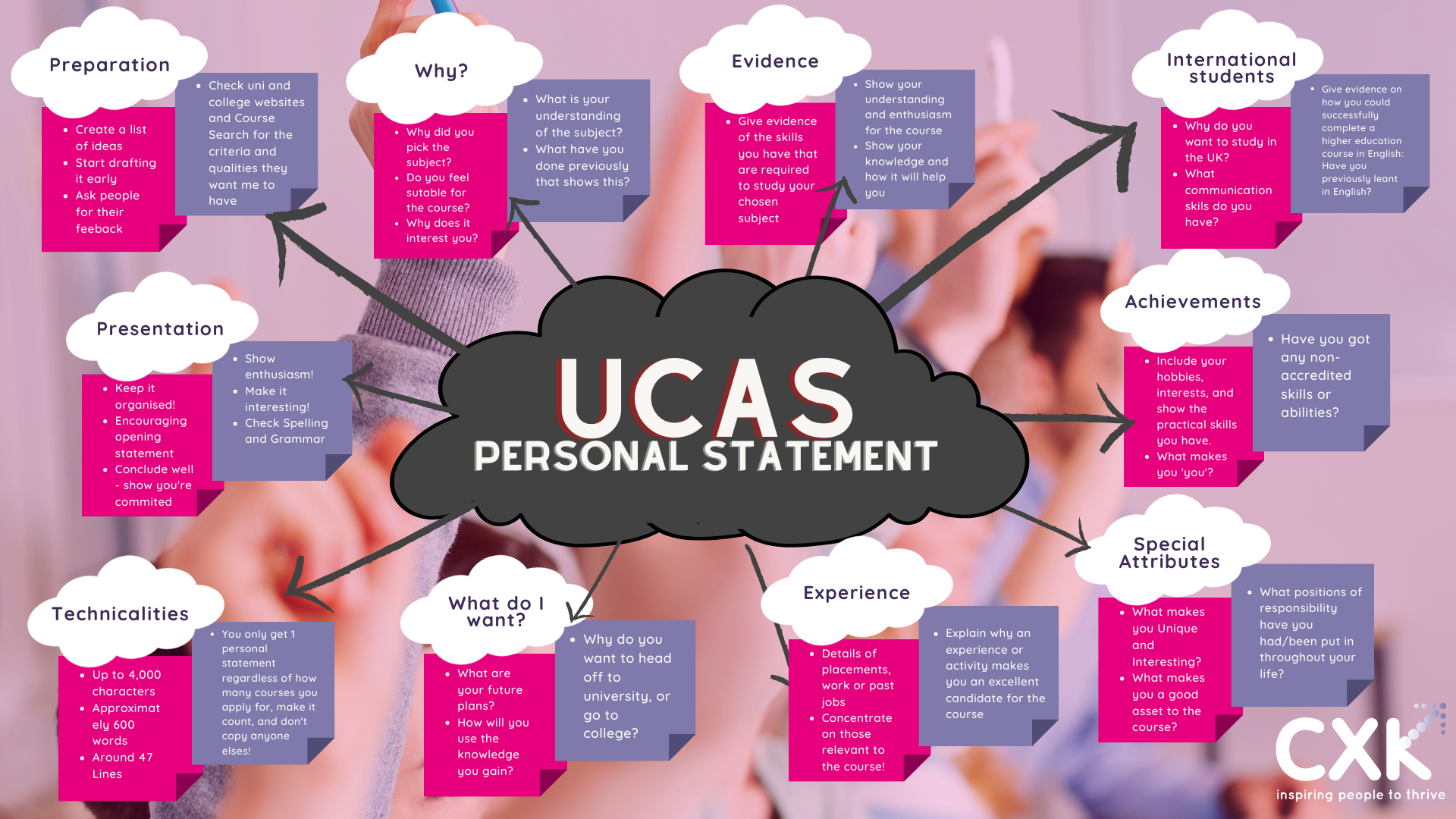Welcome to our Higher Education Guide!
This guide is aimed for students considering Higher Education who are researching their options.
- Glossary
- Why do you want to study?
- Research & Work Experience
- How to find
- Personal Statement & Student Finance
When considering Higher Education, it is worth being aware that this includes LOTS of different options with many (possibly) confusing terms. To help get you started, here is a short Glossary of the most common terms you may come across:
Why do you want to study?
Some students study for the love of a subject or for a particular career (sometimes both). Check that the course you are interested in will meet your needs and if you are looking to study for a specific career, that you have checked other routes to your goal, such as School Leaver Schemes, Gap Years, and the wide range of Apprenticeships so you don’t miss out on opportunities! (See www.cxk.org/resources)
Keep in mind you can apply for a degree at a university or college AND apply for an apprenticeship at the same time to keep your options open whilst you decide on the right path for you: https://alanbullockcareers.com/blog/ and https://www.youtube.com/apprenticeship-vs-university
It is worth being aware that many graduate jobs (which are the jobs and training available to you after studying for a degree or equivalent) are accessible through what we call the “80% Rule”. This is where graduates transfer their skills to enter graduate training within their jobs (sometimes called “on the job training”).
However, some students choose to study a subject which some employers may find desirable or useful (rather than essential), such as Accountancy & Finance Degrees for entry into the financial sector.
If you are intending to use your degree to enter the graduate job market, the effectiveness of different degrees can be researched using: https://discoveruni.gov.uk alongside the other websites listed below.
Research and Work Experience
Do your research and attend Open Days, Events, Exhibitions, Open Public Lectures and Performances throughout Year 12 to research what courses and certain careers are actually like!
Use websites like YouTube to find “virtual” university tours as well as tasters of lectures! These links will help with your research:
- opendays.com
- www.youtube.com/uni-open-day-questions
- www.cxk.org/blog/questions-to-ask-at-university-open-days
- https://www.unitasterdays.com
- www.cxk.org/resources/finding-work-experience-or-volunteering
- https://www.ucas.com/explore/search/subject-guides
- https://kmpf.org/resources
- www.prospects.ac.uk/careers-advice/what-can-i-do-with-my-degree
- www.prospects.ac.uk/postgraduate-study/study-abroad
- yearoutgroup.org
- www.seasonworkers.com
If you are a student with additional needs and/or disabilities Higher Education can be an option for you. There is lots of support and help available, explore the links below to help you:
- The Guide: Support available for Disabled Students at University (kmpf.org)
- KMPF: Making the Most of University as a Disabled Student (youtube.com)
TOP TIP! Many courses require work experience as well as grades so, organise this early in the academic year. For many schemes you apply in the October of Year 12 for your July placement! Starting early is really important: https://www.youtube.com/how-to-prepare-for-uni
How to find:
You might be unsure what your predicted grades are until the end of Year 12 (once you have taken your mocks). At this stage, use your best guess to set a range for you to research within. Much like the story of Goldilocks and the Three Bears you are looking for options that aren’t “too hot or too cold” but rather, “just right”.
· For example, if you are working at an average of: ABB in your A-levels or Distinction, Merit, Merit if taking Level 3 BTECs, you may consider searching between:
· ABC or Distinction, Merit, Pass (representing you on a bad day) and A*AA or Distinction*, Distinction, Distinction (representing you on a good day or your very best).
· This give you an initial picture between courses that are “too cold” (potentially too easy for you, against your grade potential) and “too hot” (potentially too hard for you, against your grade potential).
This is of course only a rough guide, and it is important for you to talk to your teachers so you can get a good indication of what grades you may achieve.
There are different ways to search for courses, from those which are more “analogue” to those using “Search Engines or A.I”:
Step by Step (Analogue Approach)
- Search all courses: search.ucas.com using a variety of keywords.
- Be creative in the word strings. E.g. “Drama” & “Contemporary Performance” will bring different results : https://www.youtube.com/important-university-websites
- Print off all your results and use a marker pen to cross off all those you dislike the look of, and a highlighter to circle all the ones you do.
Search Engines, Chat Bots and Filtering Tools
Use the search tool(s) of your choice and filter to narrow down the search!
- www.theuniguide.co.uk
- www.theuniguide.co.uk/a-level-explorer
- https://sacu-student.com
- www.thecompleteuniversityguide.co.uk/courses/search
- www.whatuni.com/degrees/courses
Research your initial courses in more depth. Find out how the courses are taught and how well the courses are rated for things like graduate job prospects, drop-out rate, quality of teaching and support. Various league tables compile this data in different ways, so use more than one to research!
Filtering Options:
With so many different combinations of subjects and options to choose from, including distance learning, face-to-face study, coursework, or exams, narrowing down options for Higher Education can be slightly daunting.
One approach is to consider exploring degrees as if you were shopping for a new mobile phone or similar. In the same way we might choose what things we want a new mobile phone to be good at, such as streaming videos or listening to music, we can do the same with exploring degree courses.
Consider what factors are most important to you and which ones are your priorities, a list of factors to get you thinking can be found here:
TOP TIP: It is highly recommended you use lots of different sources of information to find out what courses are like (called triangulation)… talk to teachers, employers, friends & family (online or in person). Look at a wide range of data, attend “virtual” tours and open events. Be mindful of bias from any source!
These links will get you started…
- www.theuniguide.co.uk/advice/choosing-a-course/what-do-university-league-tables-really-tell-you
- discoveruni.gov.uk
- discoveruni.gov.uk/about-our-data/#data_sources
- universitycompare.com/rankings
- universitycompare.com/guides/city
- www.timeshighereducation.com/world-university-rankings
- https://careerswriters.com/tag/higher-education/
Keep an eye on application deadlines and entry criteria carefully (including any entrance tests) as these vary from course to course. Consider applying for a range of courses so if you don’t quite get the grades you need for your first choice, you have enough for your insurance (second) choice.
Personal Statement & Student Finance
This guide will help you put together your Personal Statement:
Write your personal statement with these top tips:
- https://alanbullockcareers.com/2022/09/04/my-ucas-personal-statement-articles/
- www.ucas.com/undergraduate/applying-university/writing-personal-statement/how-write-personal-statement
- www.theuniguide.co.uk/advice/personal-statements
You can now apply for your top five courses (don’t worry if you only have a top three, you can leave a couple of spaces to fill later with late applications if needed).
- For all applications – double check deadlines and details on UCAS!
- Some courses like Law & Medicine have entrance tests that you will need to sit – check when these are and prepare! – www.theuniguide.co.uk/advice/ucas-application/which-admissions-tests-do-i-need-to-take
- Check whether work experience, portfolios or auditions are a requirement and ensure you have a plan in place to put these in place.
- Apply for student finance as soon as you can and make sure you understand the myths! https://www.moneysavingexpert.com/students/ and https://www.youtube.com/student-finance-explained
Further sources of funding are available and worth applying for: www.savethestudent.org/student-finance/student-grants-bursaries-scholarships.html
Don’t forget if you have additional educational or health needs, you can also apply for additional financial support to help you achieve: www.gov.uk/disabled-students-allowance-dsa





